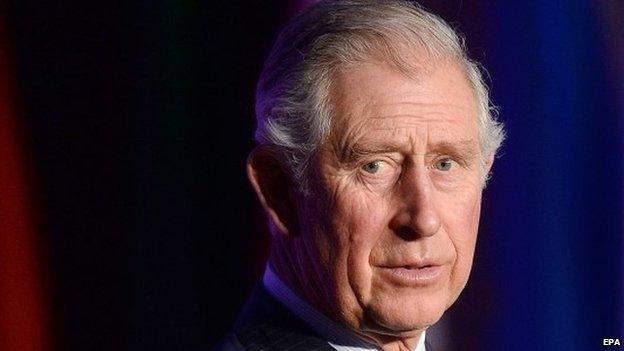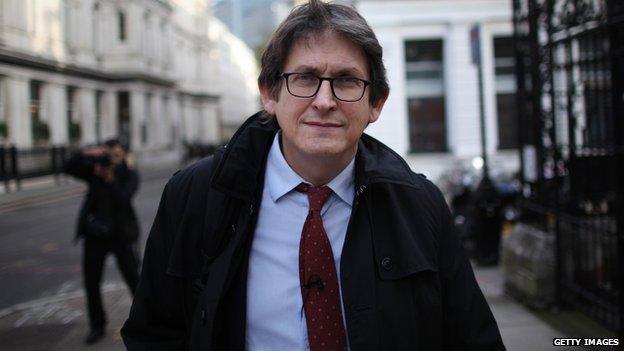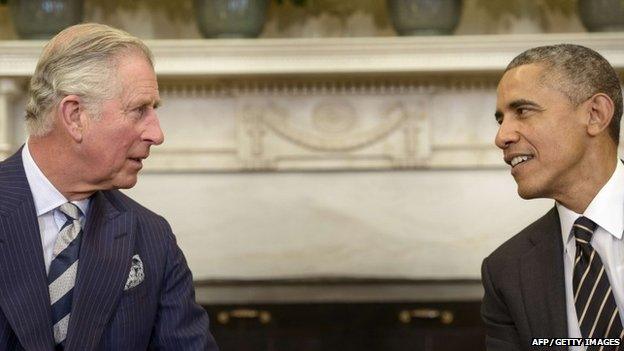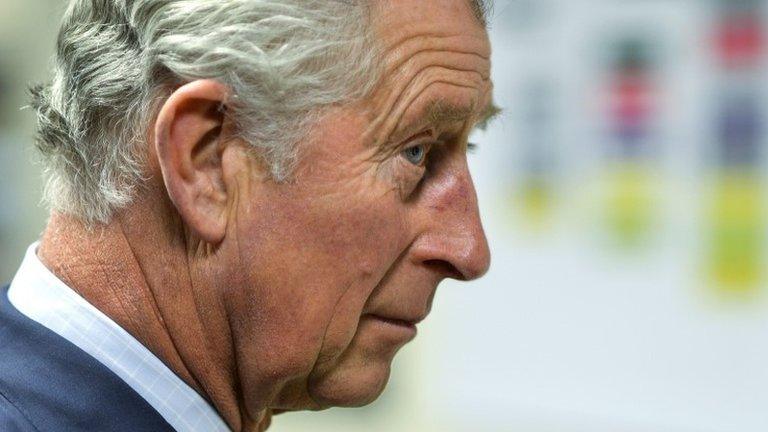What will come out of the 'black spider memos'?
- Published
- comments

A landmark legal decision has opened up questions about ministers' rights to keep official secrets and the nature of modern monarchy.
The Supreme Court announced that it was ordering the release of a tranche of letters sent by the Prince of Wales to government ministers when he was lobbying for particular causes.
The release of the so-called "black spider memos" is the culmination of 10 years of legal chiselling by Rob Evans, a reporter at the Guardian newspaper, who sought them under the Freedom of Information Act.
Indeed, in getting to the documents - which got their nickname from Prince Charles's distinctive style of handwriting -, Mr Evans has carved "a very sizeable hole" in the legislation, to use the words of one rather annoyed senior mandarin.
The ministerial veto
When the FoI Act came into force in January 2005, ministers were worried that there was a risk of public disclosure of documents which, in the view of officials, need to be kept confidential.
That is because, for the most part, final decisions about what should be released were put into the hands of a combination of the Information Commissioner, who regulates the act, independent tribunals and conventional courts.
That created a risk, in the civil service view, that outsiders lacking government experience could open up access to documents that ought to be kept secret. So the drafters introduced a ministerial veto.
This provision in the Act gave the Cabinet the right to simply kill requests, even if a court has ordered that the request be filled. It was used, for example, to block requests for documents from the lead up to the Iraq War and relating to the recent English NHS reforms.
It was used on the Prince Charles letters, too. The Evans judgment, however, has bulldozed the veto. That clause in the Act, the judges have ruled, is a very problematic legal idea and contravenes older, grander principles of public law.

Guardian editor Alan Rusbridger said the decision marked a 'good day for transparency in government'
Adam Chapman, head of public law at Kingsley Napley and a former senior government lawyer, said: "The court clearly, very strongly didn't like the prospect of a government minister overruling a decision of a court, which is the effect of the veto in this circumstance."
He continued: "It regards that as clashing with two constitutional principles, and something unique in English law."
So the judges came out against the veto. This feels like something of a moment: the Supreme Court has flexed its muscles and won.
This will have immediate effects. A veto was used to keep information on the HS2 high-speed rail link a secret. A court case on that has been stayed while the judge waited for the Evans verdict. I expect activists will rerequest the Iraq war documents, too.
Changing the law
According to the Supreme Court, it might be possible to reintroduce the veto if the Act were to be clearer about when it could and could not be used.
Mr Chapman said that the judges' problem with the veto was that "the provision in the FoI Act was not explicit enough".
David Cameron, implied he might do that. He said: "If the legislation does not make Parliament's intentions for the veto clear enough, then we will need to make it clearer."
Indeed, one senior civil service lawyer told me that any such clarification might be used as an opportunity to make it easier for officials to refuse requests on other grounds.
In their words, they might try to "sort out a few other things while the patient is on the table". That would almost certainly mean that requests would need to be smaller and less complicated.
The Supreme Court decision has certainly alarmed senior civil servants, who see it as the latest in a string of incursions by judges into transparency law.
Many senior officials in Whitehall are already openly hostile to the Act. The Cabinet Office, in particular, is openly opposed to it. It routinely refuses to comply with the law and its officials offer advice to other departments on how to follow suit.
To play the king

It has been argued the release of Prince Charles's letters will affect his political neutrality
As if that were not enough grand ramifications for one arcane judicial decision, the documents will open up the issue of Prince Charles's role.
It is worth being clear about what the judges have ordered should be released. An earlier ruling from 2012 set out that Mr Evans should only get so-called "advocacy correspondence". That is to say, when the Prince was not just expressing a view, but advocating specific policies.
This is because, the judges ruled, it will "be likely to concern matters which affect either or both of public policy and the public purse".
The judges continued that they did not want the disclosure of "purely social or personal correspondence" nor "correspondence within the established constitutional convention that the heir to the throne is to be instructed in the business of government".
The documents could have some fairly important examples of lobbying in them. Dominic Grieve, the former attorney general, said the documents might mean "he forfeits his position of political neutrality as heir to the throne". Keep an eye on that.
There will, however, be no further releases. Since the Evans case started, the Prince's correspondence - all of it - has since been granted exemption from the Act.
That's why it matters so much. Not only has Rob Evans punched a hole in the ability of officials to keep public data from the public, he may be about to give us one of the few unguarded sights we will get of the man who might one day be our King.
- Published26 March 2015
